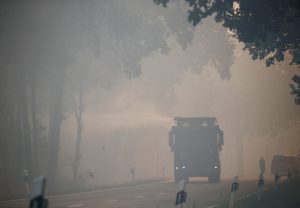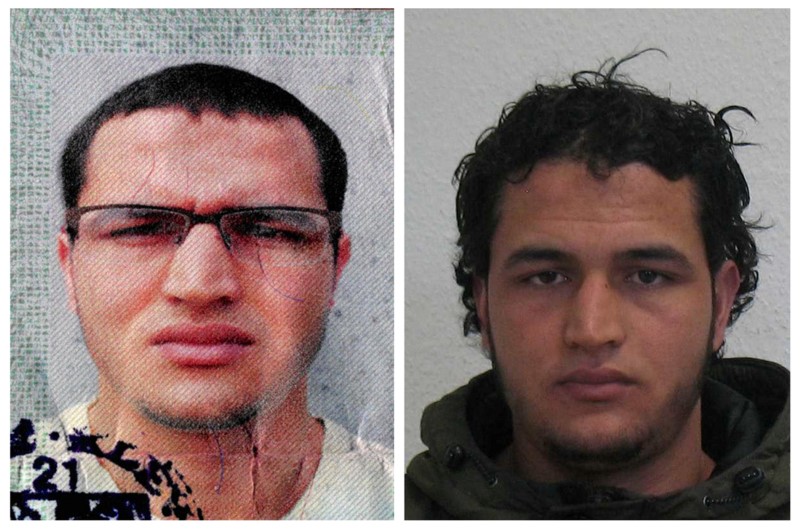
By Michelle Martin and Sabine Siebold
BERLIN, Dec 20 (Reuters) – A Pakistani asylum-seeker arrested on suspicion of killing 12 people by mowing through a Berlin Christmas market in a truck may not be the attacker and the real perpetrator could still be on the run, German police and prosecutors said on Tuesday.
The truck smashed into wooden huts serving mulled wine and sausages at the foot of the Kaiser Wilhelm memorial church, one of west Berlin’s most famous landmarks, around 8 p.m. on Monday. Forty-five people were injured, 30 severely.
News of the arrest of the 23-year-old Pakistani led politicians in Germany and beyond to demand a crackdown on
immigration, but others warned against jumping to conclusions.
Chancellor Angela Merkel told reporters: “There is much we still do not know with sufficient certainty but we must, as things stand now, assume it was a terrorist attack.”
“I know it would be especially hard for us all to bear if it were confirmed that the person who committed this act was someone who sought protection and asylum,” she added.
In a dramatic twist, police later said the suspect had denied the offence and might not be the right man.
“According to my information it’s uncertain whether he was really the driver,” Berlin police chief Klaus Kandt told a news conference.
Berlin police tweeted that they were “particularly alert” because of the suspect’s denial.
Die Welt newspaper quoted an unnamed police chief as saying: “We have the wrong man. And therefore a new situation. The true perpetrator is still armed, at large and can cause fresh damage.”
The truck belonged to a Polish freight company and its rightful driver was found shot dead in the vehicle. The Polish truck driver had arrived hours earlier in the German capital and spoken to his wife about 3 p.m., according to his cousin.
When she called again an hour later, there was no answer.
“At 3.45 p.m. you can see the movement on the GPS (Global Positioning System). The car moved forward and back. As if someone was learning to drive it,” said the cousin, Ariel Zurawski, who was also the boss of the trucking company.
“I knew something was wrong.”
Interior Minister Thomas de Maiziere said a pistol believed to have been used to kill the Pole had not yet been found.
German media said the arrested man had jumped out of the driver’s cab and run down the street towards the Tiergarten, a vast park in central Berlin. Several witnesses called police, including one who chased the suspect while on the phone, constantly updating officials on his whereabouts.
“STATE OF WAR”
Security officials in Germany and Europe have warned for years that Christmas markets could present an easy target for militant attacks. In 2000, an al-Qaeda plan to bomb the Strasbourg Christmas market on New Year’s Eve was foiled.
There were no concrete barricades at the Berlin Christmas market, as have been installed at a similar venue in Britain.
The attack fuelled immediate demands for a change to Merkel’s immigration policies, under which more than a million people fleeing conflict and poverty in the Middle East, Africa and elsewhere have arrived in Germany this year and last.
“We must say that we are in a state of war, although some people, who always only want to see good, do not want to see this,” said Klaus Bouillon, interior minister of the state of Saarland and a member of Merkel’s Christian Democrats (CDU).
Horst Seehofer, leader of the CDU’s Bavarian sister party, said: “We owe it to the victims, to those affected and to the whole population to rethink our immigration and security policy and to change it.”
The record influx has hit Merkel’s ratings as she prepares to run for a fourth term next year and has boosted support for the anti-immigrant Alternative for Germany (AfD). On Twitter senior AfD member Marcus Pretzell blamed Merkel for the attack.
AfD leader Frauke Petry said Germany was no longer safe and “radical Islamic terrorism has struck in the heart of Germany”.
The incident evoked memories of an attack in Nice, France in July when a Tunisian-born man drove a 19-tonne truck along the beach front, mowing down people who had gathered to watch the fireworks on Bastille Day, killing 86 people. That was claimed by Islamic State.
The influx of migrants to the European Union has deeply divided its 28 members and fuelled the rise of populist
anti-immigration movements that hope to capitalise on public concerns next year in elections in France, Germany and the Netherlands.
Slovakia’s Prime Minister Robert Fico said the latest attack would change perceptions of migration. “I think that the cup of patience is beginning to spill over and Europe’s public will rightly expect rather stronger measures,” he said.
“KEEP ON LIVING, BERLINERS!”
On Tuesday morning, investigators removed the black truck from the site for forensic examination. People left flowers at the scene and notes, one of which read: “Keep on living, Berliners!” One woman was crying as she stopped by the flowers.
Bild newspaper cited security sources as saying the arrested man was Naved B. and had arrived in Germany a year ago. In legal cases German officials routinely withhold the full name of
suspects, using only an initial.
A security source told Reuters the suspect had been staying at a refugee centre in the now defunct Tempelhof airport. Police special forces stormed a hangar there early on Tuesday.
Merkel said Germans must not be cowed by the attack.
“We do not want to live paralysed by the fear of evil,” said Merkel, who discussed the attack by phone with U.S. President Barack Obama and convened a meeting of her security cabinet.
“Even if it is difficult in these hours, we will find the strength for the life we want to live in Germany – free, together and open.”
Several hundred mourners joined a church service near the site of the attack on Tuesday evening to remember the victims.
Other European countries said they were reviewing security.
Austrian Interior Minister Wolfgang Sobotka called for biometric and fingerprint checks to be introduced along the Balkan route used by many migrants arriving in Europe in order to better control foreign jihadist fighters’ movements.
London police said they were reviewing their plans for protecting public events over the festive period.
Manfred Weber, head of the centre-right European People’s Party, said: “It’s not an attack on a country; it’s an attack on our way of life, on the free society in which we are allowed to live.”
(Reporting by Michelle Martin, Caroline Copley, Joseph Nasr, Emma Thomasson, Paul Carrel, Michael Nienaber, Madeline Chambers in Berlin; additional reporting by Shadia Nasralla in Vienna; Writing by Michelle Martin; Editing by Mark Trevelyan and Gareth Jones)











